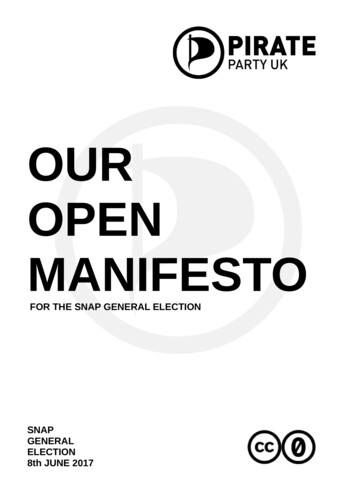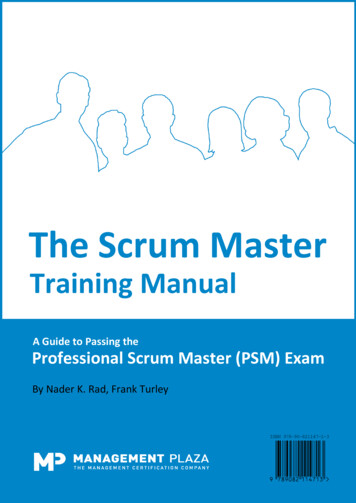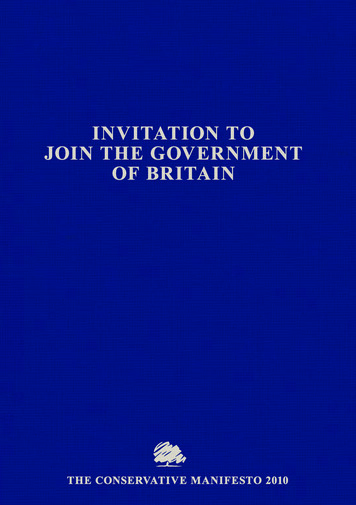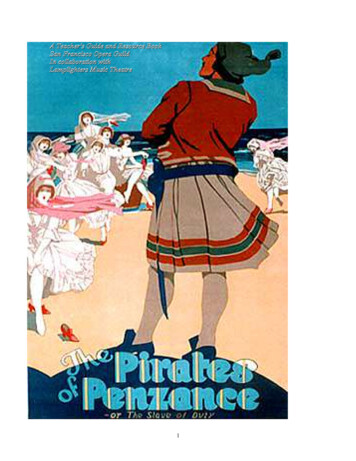
Transcription
OUROPENMANIFESTOFOR THE SNAP GENERAL ELECTIONSNAPGENERALELECTION8th JUNE 2017
ABOUT THIS MANIFESTOI thought I had tried it all and that politicalparties were no longer useful. The mainparties seldom represent my views and seemto already have their own agendas carvedout in stone (sometimes literally).I joined the Pirate Party when I saw a trulydifferent voice pointing out the faults andoffering a real alternative to the establishedold parties.Make no mistake: our freedoms are beingeroded and our digital rights are underattack. Either the major parties don’tunderstand the problems we face, or worse,they're the causeof them.I realised this wouldn’t change until people like me, people like you, got into front-line politics.We need engaged citizens - not the same, tired old career politicians.If they refuse to listen to us, we will make them listen. We’ve forged a manifesto built from yourideas. A truly open manifesto that is built from the bottom up and not from the top down. Wecrowd source a wide range of ideas and present that to government, instead of governmentturning up on your doorstep to tell you what you should believe.You have all made your own mark here. Together we’ve formed policy fit for the 21st century:protecting the NHS and expanding it with radical patent reform; abolishing tuition fees soeducation is free to all; and going even further, reshaping copyright so knowledge itself will beopened up. Our tax system needs fixing, and we need jobs to pay for the work put into them.People deserve free access in all areas, both to the digital world online and to justice offline.This manifesto is a collection of our work, and together we’re going to make politics a little bitbetter by restoring trust one vote at a time.Don’t ever let anyone tell you that you’re splitting a vote, that you’ll never achieve anything, oryou have to resign yourself to the "least bad" option.This is our world. Let’s shape it together, or someone else will.DAVID A ELSTONLEADERPIRATE PARTY UK
Index1. Core Policies2. Principles3. Civil Liberties4. Culture5. Digital Rights and Surveillance6. Economy7. Education and Innovation8. Environment9. European Union10. Foreign and Defence11. Health12. Justice13. Local14. Restoring Trust in Democracy15. Society16. Transport17. Welfare and Work18. Embracing the FutureEnd of Line
1. CORE POLICIES1.1 COPYRIGHT AND PATENT REFORM1.1.1 COPYRIGHTThe Pirate Party wants a fair and balanced copyright law that is suitable for the21st century. Copyright should give artists the first chance to make money fromtheir work, however that needs to be balanced with the rights of society as awhole.We would reduce the duration of copyright to 10 years - closer to the originalduration of 14 years - reflecting the much greater ease with which works can nowbe made and distributed.Shorter copyright will encourage artists to keep on creating new work, will allownew art forms (such as mash-ups), and will stop big businesses from relying onlarge back-catalogues rather than investing in new content.Our 10 year copyright length will include within it a renewal after 5 years (allowingworks in which the creator is no longer interested to fall into the public domainafter 5 years). An exception will be made for software, where a 5 year term willapply to closed source software and a 10 year term to open source software, inrecognition of the extra rights given to the public by open source licences.1.1.1 PATENTSWe believe that patents exist to reward the inventors of truly outstanding ideas,not to allow big businesses to stifle competition with an ever-growing tide oftrivial, incomprehensible, overreaching patents.We will stop the abuse of patent law by raising the bar on how innovative an ideahas to be before it can be patented, and by prohibiting patents on software,business methods, concepts, and works of nature.We will require a working model to be provided to the patent office before apatent is granted and we will strictly enforce the current rule that patents areinvalid if they are "obvious to someone skilled in the art".
1.2 END MASS SURVEILLANCEThe UK is one of the most watched societies in the West. Every one of us lives with anincredible level of scrutiny and snooping every day. Our communications are collected,our movements tracked, and our actions watched by the state and others. But there hasbeen little discussion about whether this surveillance is appropriate or necessary. Weknow it isn't.There has been far too little real political opposition to ever increasing monitoring. Evenwhile the Liberal Democrat / Conservative Coalition claimed it would reduce the“database state” it continued to push for more monitoring and data collection. TheLabour party has no credibility either, and apparently no will to change the current drivetowards ever more intrusive surveillance. Quite the opposite, the Labour party has beenas vocal in promoting an ever increasing surveillance state as the current Government.All of the above was true in 2011 and many pieces of the surveillance puzzle have beenknown about for a long time. Some of them like Closed Circuit TV (CCTV) andAutomatic Numberplate Recognition (ANPR) are a part of our every day life, notbecause we were asked for consent, but because we didn't do enough to oppose them.Things changed massively in 2013 following the Snowden revelations. When we talkabout surveillance today, we have to remember that the only reason we know about thefull extent of the snooping we live under is because whistle-blowers were brave enoughto make that secret information public.Our Governments haven't been open with us about the broad focus of their surveillanceor its scope. The machinery of surveillance is much bigger than we thought it was. OurGovernment has hidden the truth from us, misled us when faced with evidence, and wehave had to rely on leaks to find the truth.We will: Halt suspicionless collection of data. Demand Transparency: Force the government to be open about the scope andscale of surveillance. We know that some surveillance and monitoring isnecessary, but mass warrantless collection within the UK is unacceptable. Limit the retention of surveillance data and ensure it is deleted when the reason itwas collected no longer applies. Put in place stronger data protection controls on both government- andcommercially-collected data. Move to targeted surveillance instead of warrantless mass surveillance.
1.3 FREE SPEECHLibel law needs an overhaul. Currently it presents a huge risk to us exercising freespeech. Similarly we should not have a Government or culture too afraid ofdisagreement that opposition voices and unpopular opinions are merely banned.The solution to bad speech isn’t to ban speech, it is to have more good speech.The conduit of free speech is important for those of us who are activists and engaged inpolitics, but it also allows teachers to be free to teach, and the search for truth can onlyexist when we can speak freely. Scientists like Richard Dawkins must be allowed tofreely express their views on science and atheism and conversely the Church must beallowed to freely preach about their faith. A healthy tolerance to those we disagree withand a willingness to engage in passionate discussion is a cornerstone to a healthydemocracy if it is to grow.Even the most gently expressed opinions may accidentally offend someone. Thesolution must always be to keep the conversation going and to keep interactions flowing– or simply walk away if you aren’t interested.This desire to express ourselves is something that is inherent to the human condition. Itis the base of human rights, rooted in our very nature.Without free speech you can achieve no other objective. It comes before all otherpolicies or principals.
2. PRINCIPLES2.1Our society is built upon the sharing of knowledge, ideas, and culture. It isfurthered by freedom of thought and expression, and protected by the rule of law.The Pirate Party exists to ensure the preservation and development of thesefoundations.2.2Human dignity is inviolable. Each of us has a right to life and to live, to freedom ofthought and self-determination, and to participate in society.2.3Everyone is equal under the law. We all have a say in the structure andprocesses of governance and the right to know what is done on our behalf.2.4Respect for our private and family life by government and society is fundamentaland we all have freedom of choice in our associations and relationships.2.5To be free to participate in society everyone must have access to justice,education, and such services and infrastructure required for life within it.2.6To ensure the security of our society, it is the responsibility of the Government toprovide for its defence, the mechanisms of justice, and such services andinfrastructure required to meet its needs.2.7We will act on the basis of evidence, with the consent of society throughdemocracy, in the interests of all.
3. CIVIL LIBERTIESIt often feels like we live in a "say no first, ask questions later"society. Whether it is councils banning a 9 year old from bloggingabout school dinners or the Government threatening to suspendsocial media, the Pirate Party has always stood up for freedom ofspeech. The courts must not be used to block freedom ofexpression and knowledge, and a reform of libel laws is overdueto ensure this. The right to speak out is fundamental indemocracy.We must protect the right to protest, assemble, and strike.There are numerous criminal laws that are poorly defined,overly broad, or easily and commonly misapplied; theselaws stifle liberty. We would immediately repeal: Regulation of Investigatory Powers Act 2000 (RIPA), sections 49 & 54, which can forcepeople to hand over encryption keys, and prevent them from telling anyone about therequest. Police Reform and Social Responsibility Act 2011, sections 142-149, which preventpeople from protesting at or near the Houses of Parliament. Criminal Justice and Public Order Act 1994, sections 63-66, originally aimed at ending"rave culture".We would conduct a review of: Communications Act 2003, Section 127, which is out of date, and inappropriate for theInternet age. People should not be arrested for making jokes on Twitter.Most importantly, it is time to claim back the “commons”, even on privately owned land that isused publicly. We have the right to gather and enjoy our shared spaces, and we should be freefrom arbitrary restrictions and intrusions if we wish to do so. We want to see a rolling back ofthe more authoritarian excesses of the last few governments, including a review of terrorismlegislation and laws designed to limit a specific type of behaviour, but that now have an impacton every day life and have come to threaten us all.
4. CULTURECulture is a vital part of our country - it shouldn't be a luxury. The PirateParty wants everyone to be able to take part in and share culture. Art can becontroversial, but it is important we don't squash freedom of expression.After all, that is what so much of the successful culture of Britain has beenabout. Let's once and for all get rid of the idea that “pirates” are destroyingculture.Artists should be the focus of culture sector funding, this is wherethe research and development of the creative industries happens.Success in increasing and protecting money going to artists,rather than administration or overheads, must be one of the keyperformance indicators of National Portfolio Organisations.We will encourage and support libraries, museums, and otherorganisations that hold collections to digitise their content andmake it available online, in open formats, wherever possible.This will both preserve access to culturally important artefacts andincrease accessibility. We would prioritise the digitisation ofespecially rare items.Paper books are free from VAT yet e-books are not. A book should be defined by what itprovides, not the material that is used to produce it, and any tax on books is a tax on reading.Like paper books, e-books should be zero-rated for VAT as soon as possible.It's time to update our laws for how we consume film, music, TV, and books for the 21stcentury.A fair and balanced copyright regime that is suitable for the 21st century is an absolutenecessity for the UK to remain competitive in a global economy that is built upon ideas andinnovation. Copyright should give artists and innovators the chance to make money from theirwork; however, that needs to be balanced with the rights of society as a whole. We will work forcopyright reform and reduce copyright terms to 10 years to balance everyone's needs.Under current copyright law it is unlawful to circumvent effective technological measures thatrestrict access to copyrighted material, even if doing so is required for lawful use. This includesboth civil liabilities and criminal offences. In the event that such a “technological measure”prevents permitted acts, the only current remedy is to apply to the Secretary of State for apermit.The Pirate Party seeks to abolish these laws, making it legal both to circumvent “effectivetechnological measures” and to produce, distribute, and possess tools to aid in doing so. Thiswould not change existing copyright law, merely remove the extra layer of illegality.It's vital that we protect the new arena of digital culture for future generations. We will supportpreserving digital culture and introduce IP exceptions to allow the archiving of digital culture.We would seek to remove restrictions from broadcasters on satirising footage of Parliamentaryproceedings. Comedy can bring politics to a wider audience and we believe that MPs' andpeers' actions should not be immune from humorous criticism.
5. DIGITAL RIGHTS AND SURVEILLANCEEver since the Pirate Party was founded we have been pointing out that the new world oftechnology brings new challenges and opportunities to politics. The Internet deserves a voicein Parliament as too often our representatives have been wilfully ignorant. This is why we standfor digital rights. It is about protecting our rights and making sure that the digital revolution isavailable to all, and not just a few.For many, the online world is a place to reclaim some freedom. Here too, we areincreasingly watched and restricted. We're here to say it doesn't have to be like that.Citizens' rights to private communication are vital. We will forbid third parties from interceptingor monitoring communication traffic, and require specific warrants to be issued by a courtbefore communications traffic is monitored. We will oppose the return of the CommunicationsData Bill (“Snoopers' Charter”) or similar legislation added to any other bill. Wewill ensure that the freedom to encrypt data and communications is notabridged or limited, and that access to encryption tools is not restricted.The Parliamentary Intelligence and Security Committee must betruly independent and robust. It must act for UK citizens notprotect vested interests.We will strengthen data protection laws. Companies mustinform data subjects of their rights and be clear abouttheir data policies.We will make it easier to apply to a court forcompensation where data protection laws have been breached, and increase the penalties forany breaches. We will allow the courts to apply these penalties to both the individuals andcompanies responsible, proportional to the scale of the breach.We want clearer guidelines and restrictions on the use of DNA records by authorities. This willensure samples are only taken voluntarily or when there are reasonable grounds to suspectthe individual of having committed a serious offence. Samples should be promptly destroyed ifthe individual is acquitted or not charged, and they should only be held for the length of time forwhich there is a reasonable suspicion that the suspect has committed a crime.Too often the out-going Government's digital policy has been directed by tabloid headlines, notexperts in the field. We will stop the imposing by government of censorship tools such as socalled "web filtering" or site blocking as blanket tools. We will cut the copyright cops, PIPCU.We will repeal the sections of the Digital Economy Act that conflict with digital rights. Everyoneshould have equal right to access the benefits that technology can bring. We will extend therequirement to provide basic telephone services to a requirement to provide a minimum levelof broadband service and extend this responsibility to all providers who operate in the UK.We know that the UK's future success depends on a modern broadband infrastructuresupporting a free and open Internet. We must aim to end the "Digital Divide". We will promotethe provision of free public WiFi as well as the provision of Internet access in communitycentres and libraries by local authorities. It is vital that no one is excluded from the digitalrevolution. We will promote the inclusion of accessibility features, such as subtitles and audiodescriptions for the disabled. Our aim is to make content accessible for disabled people. Wewill introduce an obligation for publishers to provide a DRM-free copy of their product wherenecessary to allow the use of accessibility programs (e.g., voice synthesiser software to "readout" an e-book to a visually impaired person).
6. ECONOMYWe need an economy that works for everyone. In the last 5 years the UK has seen cuts toservices, a fall in wages and a cynical attack on the support the state offers those in need. Wehave seen publicly owned companies, including Royal Mail, the Fire Service College, andRemploy sold off for little gain to the taxpayer, but great returns for investors. UK debt is higherthan it was in 2010. The deficit is higher than at any time until we bailed out the banks, andunemployment is still at 4.7%. We can do better. We want to shore up government finances,and increase tax revenues while increasing pay at the lower end of the pay scale. A 50%marginal rate of tax would be added for income over 500k per year.Austerity is not going to repair the UK economy. We face a number of challenges, from a lackof social housing to poor transport and communications links that can be dealt with by initiatinginfrastructure projects. Such projects provide long-term benefit to the UK, stimulating currentand future growth.We would increase the rate of high speed broadband expansion, improve public transport(particularly outside London), and make Britain a world leader in renewable energy. This willallow us to reduce unemployment and provide skills to people who have lost jobs in other partsof the economy.We must remove Intellectual Property laws that are hampering growth. It's time to stop the tideof over-reaching patents and trivial lawsuits that are tying up new ideas and killing off start-ups.The “too big to fail” culture that contributed to the economic crisis is still alive and well in theUK; we want to stop the UK taxpayer from propping-up incompetent or overstretched banks.There should be no more bank bailouts, and mechanisms must be put in place to deal withfailures. To reduce reckless or questionable behaviour, directors of large public companiesshould have a personal liability for their actions and decisions.Taxation should be fair to the taxpayer: those earning least should pay a smaller amount ofincome tax, and should always have a lower marginal tax rate. That marginal tax rate shouldapply to all taxes on income, whether from employment, investments, or other instruments. Wewould simplify the tax system to ensure that it is as fair as possible. We want everyone to keepas much of the money that they earn as we can, but it must be the impact of taxation that isfair, not simply the amounts involved.We would take action to reduce tax avoidance and act on tax evasion. A dedicated tax ministerwith clear responsibilities to us all would ensure all businesses and individuals are contributing,and that no group faces an excessive burden. Companies whose structures shift their taxburden abroad or into tax havens would be excluded from winning public sector contracts.We support the implementation of a Land Value Tax (LVT). LVT would raise more from thewealthiest without penalising the poor, whilst at the same time being much harder to dodgethan income tax. It would support economic productivity, as those who rely on existing assetsfor income would be charged, whereas those who work for a living would not.Many industries that are essential to the United Kingdom (including water, electricity generationand supply, gas supply, and other utilities) have been privatised in recent decades, butcontinue to rely on massive government subsidy for infrastructure investment. These privateorganisations then take millions in support, whilst channelling profits to shareholders anddirectors. We believe that when taxpayers subsidise services, the taxpayer should see a returnon their money before private investors are paid dividends. We would renationalise the RoyalMail and protect it from being damaged by cherry-picking private competitors. In addition wepropose that any government subsidy or grant to a profit-making company for the delivery ofservices should be met pound-for-pound by private investment.
7. EDUCATION AND INNOVATIONEducationWe need an education system that delivers a great education toeveryone and makes it possible for people of any age to reach theirfull potential. It means investing in early years, primary, andsecondary education, and removing barriers to higher educationby scrapping tuition fees.The framework for early years education must be updated toensure it meets the needs of children before they get toschool. We also need to ensure that early years teachershave time to teach, by reducing the administrative burdenwhere possible.Parents in some areas are facing a shortage of school places, particularly in primary schoolswhere they are seeing increased class sizes or small schools with too many pupils enrolled.We want to give local authorities the legal powers they need to plan and provide enoughschool places in their areas. The Government must ensure that funding is available to deliverschool places where needed. Local authorities should be at the centre of, and responsible for,the local democratic control of education.The national curriculum should be about "what", but not "how", so that schools and teacherscan teach in a way that best benefits the student. Schools should have the freedom to spendtheir budgets as they see fit and should be encouraged to invest in knowledgeable,enthusiastic and well qualified teachers.Schools must aim to educate, not to simply pass exams. The number of examinations thatyoung people sit should be reduced, and schools should be judged on a broad range ofindicators. The public ranking of schools by exam results should be discontinued.To minimise the impact of changes to grading criteria, and to ensure that exam results remaincomparable in the long term, we will assess the effectiveness of a percentile-based gradingsystem.InnovationOur economy depends upon innovation. We need to make sure we have the right policies inplace to support innovators in all sections of the economy.The UK has a very strong technology development and scientific research sector, howeverresearch funding is at a 20-year low of 0.5% of GDP. We would increase funding of research toat least 0.8% of GDP, matching the G8 average.That research investment must be open to all. For that reason we support open access tooutputs of publicly funded scientific research. We need Research Councils UK (RCUK) tocontinue its commitment to full open access, and to provide grants to scholar-led open accessjournals and data archives. It is also important that we can build on the work of others: patentsexist to reward the inventors of truly outstanding ideas. We would reform the patent system toensure it does just that, and prevent patents from being used to stifle competition.We will allow and encourage more competition in the manufacturing of patented devices byintroducing a system of compulsory patent licensing, and we will provide exemptions to patentlaw for non-commercial use, personal study, and academic research.
8. ENVIRONMENTWe need smart policy to improve our environment. Theenvironmental challenges, from dealing with local “grotspots” toclimate change, are monumental. We have a responsibility to lookafter our environment and wildlife. This requires changes in allparts of our economy and in our behaviour, but if we work togetherwe can deal with these challenges.If we want to be at the forefront of innovation in energy and getthe most out of our resources and environment, we need to setand meet ambitious goals. We know the UK can exceed thetarget of 80% reductions in emissions between 1990 and 2050.Litter is more than a blight on our landscape: it is anindication of wasted resources. We can work together toimprove the areas where we live and at the same time dealwith a threat to our world. Using new technologies forpower generation and to fuel our cars will help a great dealtoo: we want to see investment in British engineering tobring about the changes and technology that we need.There are simple solutions, too. We support bringing in a bottle return scheme (paying for adeposit on bottles and cans which is given back when they are returned). This would reducelitter and the burden on recycling facilities, as well as changing attitudes towards our preciousresources. Making polluters pay for the damage they do to our environment, whether they arebig businesses or irresponsible landowners is the right thing to do.Open spaces must be protected, land ownership must be transparent, our common heritagemaintained, and developers made to act responsibly. It is time for a fair environment policy.There should be a new focus on littered and polluted "problem" areas, and a more proactiveEnvironment Agency.Power generation will be a major issue facing the UK in the coming decade. The nextGovernment will have to put together an effective and environmentally sound policy to ensurewe have the required generation capacity. We believe that the focus should be on renewableenergy as well as investigating and developing new technologies.Removing public subsidies to fossil fuel and hydrocarbon production and focusing support onrenewable production would help to continue the UK's switch to cleaner, sustainable energy.We shouldn't just focus on large generators though, continuing the feed-in tariff would willensure that small scale renewable power generation remains attractive.
9. EUROPEAN UNION AND INTERNATIONAL TRADE9.1 THE EUROPEAN UNION9.1.1 BREXITWe recognise the result of the 2016Referendum on the UK's membership of the EU.With a 52% share of the vote to Leave, itrepresents a clear desire to change ourrelationship with the EU. However, thePirate Party is unable to either proceed withthe exit or reverse it alone. As such, thePirate Party would support any outcomethat ensures and safeguards our principles,such as the protection of human rights, civiland digital liberties, knowledge sharing,accountability and transparency ofgovernment, and evidence-based policymaking.9.1.2 EUWhile we remain a member of the EU, and should we continue to be members,we will push for the EU to uphold our principles, and to work further towardstransparency and accountability by moving law-making powers away from theCommission and Council towards the directly-elected European Parliament, to bemore in line with the UK's own Parliamentary system. We would also call for theEU to ensure it limits decision making to supranational issues, and correctlydevolves responsibility for national issues to the respective national governments,only providing guidance where necessary.We would continue to keep the UK out of the Euro. We would push to ensure theEU doesn't make joining the Euro a membership requirement now or in thefuture. We would also aim to ensure that non-Euro countries aren't prejudice intheir decisions affecting the Common Market. We will continue to withholdsupport for the European Monetary Union until such a point as they candemonstrate they can use an economic model that balances the load betweenmembers of the union to ensure that a fiscal crisis such as the one that occurredin Greece isn't allowed to happen again.We will seek to minimise or abolish EU data retention laws and remove them inthe UK, to limit the amount of private information websites are required to logabout their users. We do not support the Intellectual Property Rights EnforcementDirective (IPRED), an attempt by the European Union to increase penalties andeventually criminalise commercial copyright and patent infractions within the EU.IPRED, which includes confiscatory and subpoena powers to copyright holders incivil cases, should be repealed and attempts to bring forward IPRED2 should behalted. SWIFT data and passenger records should not be permitted to leave theEU without a concrete suspicion of crime that is punishable within the EU state inwhich the data originated.
9.2 INTERNATIONAL TRADEThe Pirate Party will commit to pushing for negotiations that protect existing industriesand without compromising our principles. The Pirate Party is wary that on leaving theEuropean Union, we may be susceptible to being pushed into deals like the AntiCounterfeiting Trade Agreement (ACTA) by larger trading partners such as the US,which contain policies like Investor-State Dispute Settlement (ISDS) agreements thatcould jeopardise the independence and competitiveness of public-sector services.
10. FOREIGN AND DEFENCEDefence of the realm is a primary responsibility of government. The United Kingdom must beable to meet its own defence needs as well as its obligations to defend overseas territories andallies. Whilst we are not in favour of so-called “pre-emptive defence” or an aggressive defenceposture, we
The Pirate Party exists to ensure the preservation and development of these foundations. 2.2 Human dignity is inviolable. Each of us has a right to life and to live, to freedom of thought and self-determination, and to participate in society. 2.3 Everyone is eq










